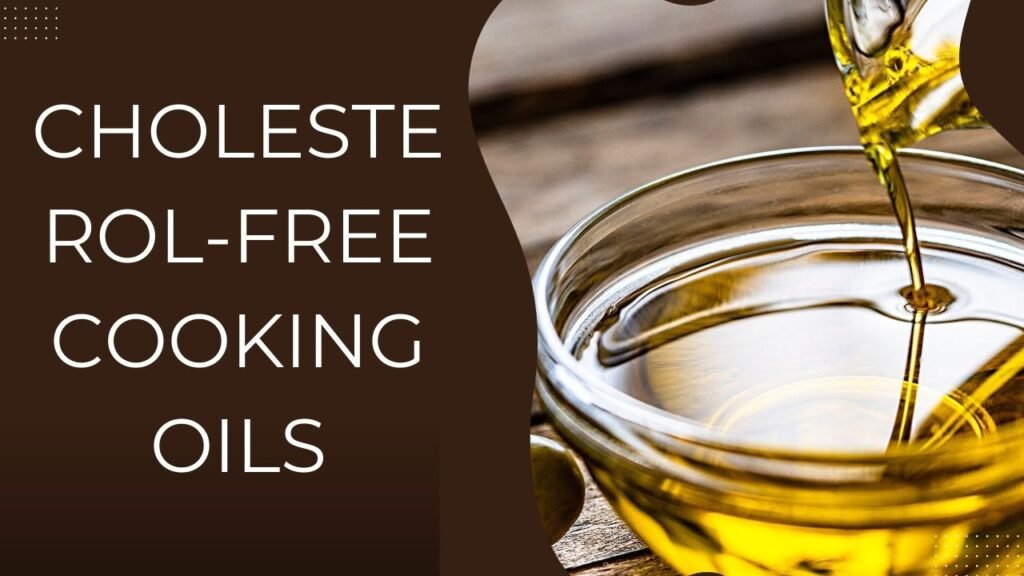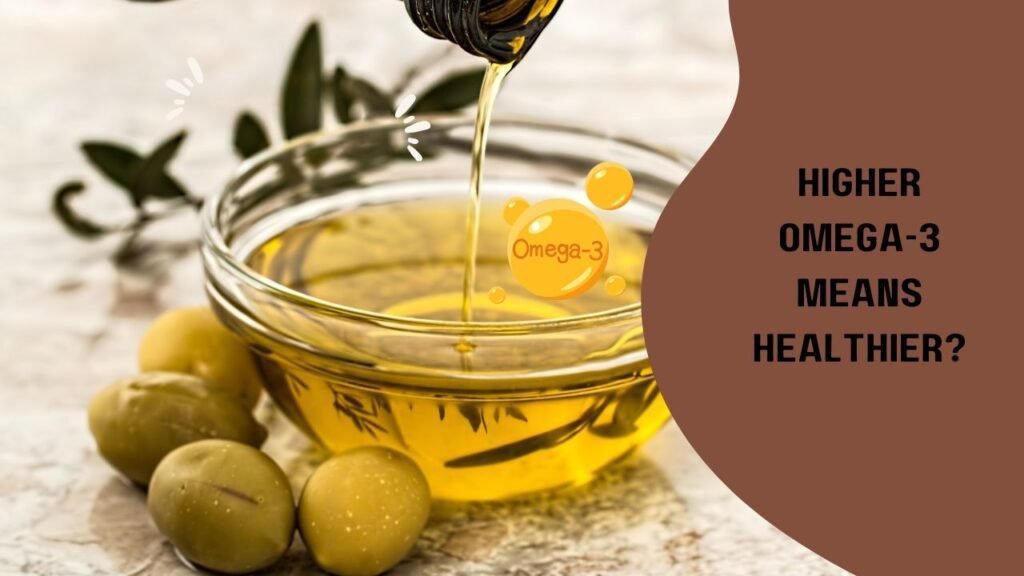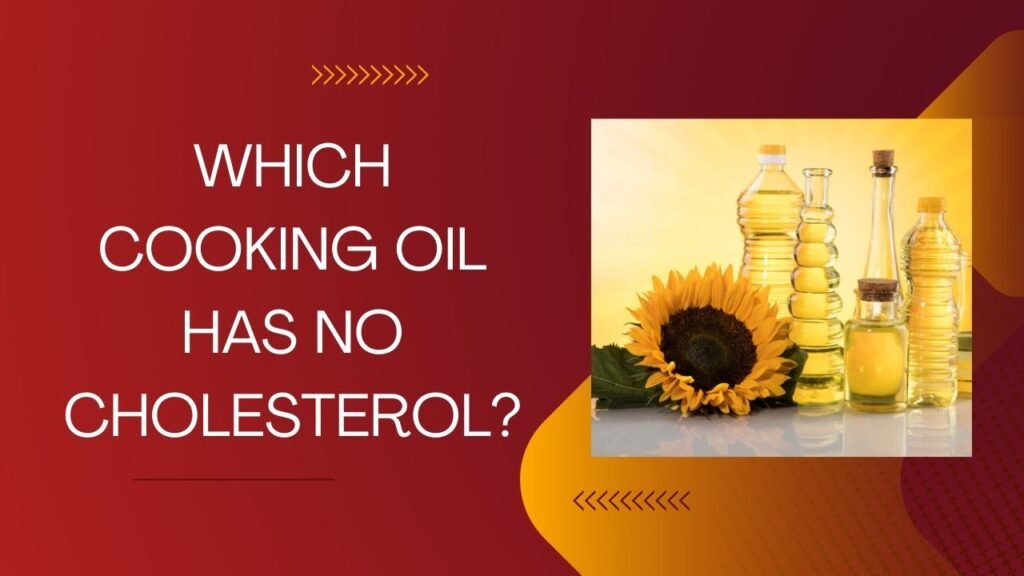Imagine preparing a delicious meal knowing you’re making a heart-healthy choice by selecting the right cooking oil. Which cooking oil has no cholesterol is a question many health-conscious individuals ask to maintain a balanced diet. Cholesterol management is crucial for overall health, and choosing the right cooking oil plays a significant role. Let’s explore the world of cholesterol-free cooking oils, their benefits, and how to incorporate them into your daily meals for a healthier lifestyle.
Understanding Cholesterol in Cooking Oils
What Is Cholesterol?
Cholesterol is a waxy, fat-like substance found in all cells of the body. It’s essential for building healthy cells, producing certain hormones, and aiding in the production of vitamin D. However, having high levels of cholesterol, particularly low-density lipoprotein (LDL) cholesterol, can increase the risk of heart disease and stroke.
Cholesterol and Cooking Oils: Myth vs. Fact
A common misconception is that all fats contain cholesterol. In reality, which cooking oil has no cholesterol is straightforward: plant-based oils do not contain cholesterol, while animal-based fats do. This distinction is crucial for those looking to reduce their cholesterol intake and improve heart health.
- Plant-Based Oils: Naturally free of cholesterol.
- Animal-Based Fats: Contain varying levels of cholesterol.
Exploring Cooking Oils with No Cholesterol
When asking which cooking oil has no cholesterol, the answer lies in plant-based oils. These oils are not only cholesterol-free but also offer various health benefits due to their favorable fat compositions.
Top Cholesterol-Free Cooking Oils
- Olive Oil
- Canola Oil
- Coconut Oil
- Sunflower Oil
- Safflower Oil
- Avocado Oil
- Grapeseed Oil
- Flaxseed Oil
- Sesame Oil
- Hemp Seed Oil
Table: Comparison of Cholesterol-Free Cooking Oils
| Cooking Oil | Smoke Point (°F) | Flavor Profile | Best Uses | Health Benefits |
|---|---|---|---|---|
| Olive Oil | 375-420 | Rich, fruity | Salad dressings, low-heat cooking | High in monounsaturated fats, antioxidants |
| Canola Oil | 400-450 | Neutral | Frying, baking, sautéing | Low in saturated fats, contains omega-3 |
| Coconut Oil | 350-385 | Sweet, tropical | Baking, sautéing, roasting | Contains medium-chain triglycerides (MCTs) |
| Sunflower Oil | 440 | Mild, neutral | Frying, baking, roasting | High in vitamin E, low in saturated fats |
| Safflower Oil | 450 | Neutral | High-heat cooking, salad dressings | High in unsaturated fats, vitamin E |
| Avocado Oil | 520 | Mild, buttery | High-heat cooking, grilling | High in monounsaturated fats, vitamin E |
| Grapeseed Oil | 420 | Light, neutral | Sautéing, grilling, dressings | Rich in polyunsaturated fats, vitamin E |
| Flaxseed Oil | 225 | Nutty | Salad dressings, smoothies | High in alpha-linolenic acid (ALA), omega-3 |
| Sesame Oil | 350-410 | Nutty, robust | Asian cuisine, stir-fries | Contains antioxidants, healthy fats |
| Hemp Seed Oil | 330 | Earthy, nutty | Salads, cold dishes | Balanced omega-3 and omega-6 fatty acids |

Nutritional Benefits of Cholesterol-Free Cooking Oils
Healthy Fats: Monounsaturated and Polyunsaturated
Cholesterol-free cooking oils are typically rich in monounsaturated and polyunsaturated fats, which are beneficial for heart health. These fats help reduce bad LDL cholesterol levels while maintaining good HDL cholesterol levels.
Omega-3 and Omega-6 Fatty Acids
Many cholesterol-free oils contain essential fatty acids like omega-3 and omega-6, which play crucial roles in brain function, inflammation reduction, and overall cellular health. For instance, flaxseed oil is exceptionally high in omega-3s, making it a powerhouse for those seeking to boost their intake.
Antioxidants and Vitamins
Oils such as olive and sunflower oil are rich in antioxidants like vitamin E. These compounds help protect your cells from oxidative damage, supporting overall health and longevity.
How to Choose the Right Cholesterol-Free Cooking Oil
Factors to Consider
When deciding which cooking oil has no cholesterol fits your needs, consider the following factors:
- Smoke Point: The temperature at which oil begins to smoke and break down. Higher smoke points are ideal for high-heat cooking.
- Flavor Profile: Choose oils that complement the flavors of your dishes.
- Nutritional Content: Look for oils rich in healthy fats and essential fatty acids.
- Storage Requirements: Some oils need to be refrigerated to maintain freshness.
Best Oils for Different Cooking Methods
High-Heat Cooking
- Avocado Oil: With a smoke point of 520°F, it’s perfect for grilling and frying.
- Safflower Oil: Suitable for high-heat frying and stir-frying.
Low-Heat Cooking and Dressings
- Olive Oil: Ideal for salad dressings and low-heat sautéing.
- Flaxseed Oil: Best used in cold dishes to preserve its delicate omega-3s.
Table: Best Cooking Oils for Specific Uses
| Cooking Method | Best Cholesterol-Free Oils | Reasons |
|---|---|---|
| Frying | Avocado Oil, Safflower Oil | High smoke points, neutral flavors |
| Baking | Canola Oil, Grapeseed Oil | Neutral taste, consistent texture |
| Salad Dressings | Olive Oil, Flaxseed Oil, Hemp Seed Oil | Rich in flavor, high in omega-3 fatty acids |
| Sautéing | Canola Oil, Grapeseed Oil, Olive Oil | Versatile, maintains oil stability at moderate heat |
| Grilling | Avocado Oil, Sunflower Oil | High smoke points, robust flavors |
| Asian Cuisine | Sesame Oil, Grapeseed Oil | Distinct flavors, suitable for stir-frying |
Tips for Using Cholesterol-Free Cooking Oils
Proper Storage
To maintain the quality and nutritional benefits of your oils, store them correctly:
- Cool, Dark Place: Keep oils away from direct sunlight and heat sources to prevent oxidation.
- Airtight Containers: Ensure bottles are tightly sealed to minimize air exposure.
- Refrigeration: Some oils, like flaxseed and hemp seed oil, benefit from refrigeration to prolong shelf life.
Measuring and Portion Control
Even though some oils are lower in calories, it’s essential to use them in moderation. Measuring your oil with a tablespoon can help control calorie intake and ensure you’re using just the right amount for your recipes.
Incorporating Oils into Recipes
- Dressings and Marinades: Use a combination of oils and acidic ingredients like vinegar or lemon juice to create flavorful dressings.
- Smoothies: Add a tablespoon of flaxseed or hemp seed oil to your smoothies for an omega-3 boost.
- Baking: Substitute butter with canola or grapeseed oil in baked goods for a healthier alternative.
Common Myths and Misconceptions
All Plant Oils Are Healthy
While plant-based oils are cholesterol-free, not all are created equal. Some oils are highly processed and may contain unhealthy trans fats or high levels of omega-6 fatty acids, which can promote inflammation if consumed in excess.

Higher Omega-3 Means Healthier
Omega-3 fatty acids are beneficial, but balance is key. A diet overly rich in omega-3s without sufficient omega-6s can disrupt the balance essential for optimal health.
Flavor Over Nutrition or Vice Versa
It’s possible to find oils that offer both great flavor and nutritional benefits. For example, olive oil not only enhances the taste of salads but also provides heart-healthy monounsaturated fats.
Personal Reflections: My Journey with Cholesterol-Free Oils
Switching to cholesterol-free cooking oils was a game-changer for my health and cooking experience. I used to rely heavily on butter and lard, unaware of their cholesterol content. Discovering oils like canola and flaxseed transformed my meals, making them both delicious and heart-friendly. It’s amazing how a simple change in oil choice can impact both flavor and well-being. Understanding which cooking oil has no cholesterol empowered me to make better dietary choices without sacrificing taste.
FAQs About Which Cooking Oil Has No Cholesterol
1. Do all plant-based oils have no cholesterol?
Yes, all plant-based oils are naturally free of cholesterol since cholesterol is only found in animal products.
2. Can cholesterol-free oils help lower my cholesterol levels?
Using cholesterol-free oils, especially those rich in monounsaturated and polyunsaturated fats, can help improve your cholesterol levels by reducing bad LDL cholesterol and increasing good HDL cholesterol.
3. Is coconut oil healthy even though it’s high in saturated fats?
Coconut oil is cholesterol-free and contains medium-chain triglycerides (MCTs), which can be beneficial in moderation. However
, it is high in saturated fats, so it should be used sparingly within a balanced diet.
4. Can I use olive oil for high-heat cooking?
Extra virgin olive oil has a lower smoke point (375-420°F) compared to light olive oil (465°F). For high-heat cooking, light olive oil is a better choice as it can withstand higher temperatures without breaking down.
5. Are there any cooking oils that have both low calories and no cholesterol?
Cooking sprays are the best option if you’re looking for oils with the lowest calories and no cholesterol. They provide a thin layer of oil, significantly reducing the amount used compared to pouring oil directly from the bottle.
Table: Best Cooking Oils for No Cholesterol and Specific Health Benefits
| Cooking Oil | Health Benefit | Best Use | Calories per Tablespoon |
|---|---|---|---|
| Olive Oil | High in monounsaturated fats | Salad dressings, low-heat cooking | 120 |
| Canola Oil | Contains omega-3 fatty acids | Frying, baking, sautéing | 120 |
| Flaxseed Oil | Extremely high in omega-3 (ALA) | Cold dishes, smoothies | 120 |
| Walnut Oil | Rich in omega-3 and antioxidants | Drizzling, baking | 120 |
| Grapeseed Oil | High in polyunsaturated fats | Sautéing, grilling, dressings | 120 |
| Safflower Oil | High in vitamin E and unsaturated fats | High-heat cooking, salads | 120 |
| Sunflower Oil | Contains vitamin E | Frying, baking, roasting | 120 |
| Avocado Oil | High in monounsaturated fats | High-heat cooking, grilling | 120 |
| Sesame Oil | Contains antioxidants and healthy fats | Asian cuisine, stir-fries | 120 |
| Hemp Seed Oil | Balanced omega-3 and omega-6 fatty acids | Salads, cold dishes | 120 |
Final Thoughts
When considering which cooking oil has no cholesterol, plant-based oils are the clear winners. They not only provide a cholesterol-free option but also offer a range of health benefits, from heart-healthy fats to essential fatty acids. By selecting the right oil for your cooking needs and using it wisely, you can enhance both the flavor and nutritional value of your meals.
Remember, moderation and balance are key. Even though these oils are healthy, they are still calorie-dense, so using them in appropriate amounts is essential for maintaining a balanced diet. Explore different oils, experiment with their flavors, and enjoy the journey to healthier, heart-friendly cooking. Happy cooking!


